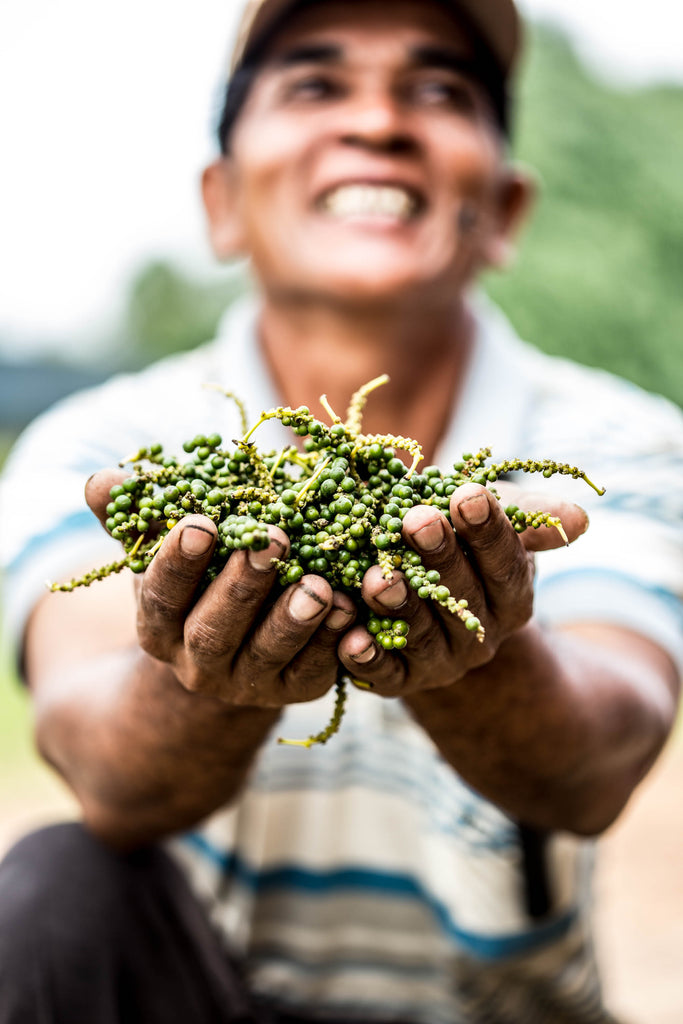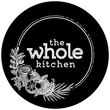Norbert Binot, Fair Farms, Cambodia

We had a chance to catch up with our good friend and long-time partner Norbert Binot at his home in Singapore. In 2014 Fair Farms was established in Cambodia; a 9 hectare farm dedicated to the Kampot Peppercorn. The Whole Kitchen uses Fair Trade and Organic Kampot Black Pepper to make one of our popular nutritious snacks; Pepper Pepitas Seed Mix. Read our blog to learn about Norbert's journey and the story behind Fair Farms, their challenges, and their passion for being a fair-trade company and the exciting adventures to come for the Fair Farms family.
Please tell us your family upbringing and how you ended up here in Singapore.
I was born in the North of France. My mother was a Math Teacher and my dad an Engineer. My grandparents were entrepreneurs on one side and farmers on the other side. And before them, the whole family has always been in farming. When I turned 18 I went to Paris for my studies. I studied IT engineering. I did internships in India and Vietnam, and finally finished my studies in China. Those experiences created a kind of passion for Asia and I decided that I would come to Asia right after I got my degree. So I came to Singapore in early 2019 to find a job and started my career in the fin tech industry.

How did you end up being a farmer in Kampot Cambodia growing peppercorns? Tell us about the AOP standard and your thoughts on this.
In late 2013 I joined NYSE. We had an office with 17 employees. 2 months after I joined the company was acquired and they let go 16 people. Everybody but me. I was the last man standing and clearly, I had a lot of free time... At the same time, I met with the uncle of my fiancee Celine. Celine was born in France but her mother is from HK and her father from Cambodia. Her uncle was at the time in the wood business in Cambodia. During my discussion with him, he mentioned this premium pepper grown in Cambodia. The Kampot pepper. I didn't know much about pepper but I wanted to learn more so I started reading books and articles and decided that I would go to Cambodia to learn more about Kampot pepper. I fell in love with the region and the ancestral way of growing this spice. I made a business plan, found 2 partners, and in 2015 we created Fair Farms and bought 9 hectares of land.
The AOP recognized savoir faire for a dedicated product. It sets rules and guidelines to produce specific products. There is a notion of territory as well. You can make Champagne only in the Champagne region in France, and follow certain rules. It's the same for Kampot pepper. We need to follow rules to grow it (organic, spacing between the trees, seasons for harvesting, ...) and we can only grow it in the Kampot province of Cambodia. I think AOP ( or GI "geographical indication") is important to preserve the world agricultural heritage. On the flip side, I think those rules set for GIs should evolve with time. For example, to grow Kampot pepper it is required to constantly remove the grass from the ground. This doesn't make sense at all as we should keep the ground cover to create biodiversity, regenerate the soil, bring nutrients, absorb CO2 & nitrogen, counter erosion, ... Fair Farms is working on a project to change the mentalities on that topic.

What does it take for a company to be fair trade?
It doesn't take anything, yet you have to give a lot :)
Most people don't understand what Fair Trade means. People usually see it as a way to properly compensate farmers for their hard work. That is part of the equation, but Fair Trade is much more than that.
First of all, I think it's important to mention that the word "Fair Trade" is widely used and that there are far too many self proclaimed Fair Trade companies. It is used as a buzz/marketing word, so I would recommend the buyers to check what the seller means by Fair Trade. If you don't see a proper logo from a recognized Fair Trade standard ( FFL, WFTO, Flocert), don't buy as you are most probably contributing to something not in line with your ambitions..
To go back to your question, there is a notion of fair payment in Fair Trade but it's much more than just that. There are notions of gender equality, inclusion, no force labour, no child labour, respect of the environment. We just finished our audit for this year and it covered more than 350 points...

There is also a Fair Trade fund that has been created. Each time a Fair Trade partner buys our pepper, he also gives us a 5% bonus on the total contract value that we put in a fund. All people impacted by our activity (temporary staff, permanent workers, local cooperative, ... ) can then decide what to do with this money. Last year they decided to use part of the money to help poor people impacted by covid and distribute food. We installed water filters & toilets in some houses too. This year we work on a school project. All the money used is generated by the Fair Trade contracts. We are being audited every year by Ecocert for our Fair Trade certificate. We are Fair For Life certified.
What does it take to become certified organic? Which governing body is this and what are the processes?
To be organic certified by a real standard (USDA, EOS, JAS), you need to respect a set of rules defined by dedicated authorities. For example, USDA is set by NOP for USA. In Europe, the European union set rules called EOS. There are a few private certification body that have the proper accreditations to audit producer/manufacturer/... and grant them the organic certificate.
After completing an application form and preparing a shitload of documents ( trust me, it's super boring), you can be audited. An auditor will come to your farm and inspect basically everything. Samples are taken and sent to a lab for pesticides and other chemical analysis.
Another important point is the traceability system. We need to be able to know where the product is coming from and where it goes.

What are you doing differently as an employer in Cambodia? (social impact/insurances etc).
I guess we just let our heart and passion drive us. We don't pretend that we are having a massive impact, but we do whatever we can to contribute to a better world.
It goes from inclusion to child protection, access to education, gender equality, ... we try and share as much as we can with the communities around us so mentalities evolve.
Then we play the same rules as the one we would play in the Human rights country: France. Our contract with our staff is the same as the one we would get in France (health insurance, holidays, maternity leaves, bonus...). So we don't have turnover!
Quick note: Fair Farms was the first Fair Trade and organic company of Cambodia. This year we have been awarded the prize for the company with the best corporate social responsibility and environmental responsibility of the Kingdom of Cambodia.
We are being audited every year by Ecocert for our Fair Trade certificate. We are Fair For Life certified.

What's next for Fair Farms?
We have an exciting organic and Fair trade project in the pipeline. It's too soon to share more for the moment!
We are working on cover crops to regenerate soils that have been depleted of nutrients, we are launching a unique project around biodiversity, we plan to launch a school by 2022, ... There is a lot to come!
We are also working with a 100% female cooperative in Afghanistan to promote saffron and gender equality.
Where are you selling the pepper and spices?
Mostly in France and a bit in Singapore. We have a long term relationship with our first supporters such as The Whole Kitchen and Julien Royer from Odette!

How has Covid impacted you?
People now understand that they should be careful with what they eat. So the demand for organic product has been raising
With covid, everyone had to eat from home, and so they had to cook. So they bought more products and more pepper. Our volumes almost tripled with Covid.
What are the Agricultural challenges you are facing?
My grandfather who was a farmer used to say " rain is money falling from the sky". It has never been so true.
Climate change has a massive impact on our culture. We are at the mercy of the weather. So we put in place an irrigation system to protect our culture, but nothing will replace a good rain.

We have personally shared many lunches and dinners, what's your favourite all time food to share at the table?
"La poule au pot" as known as "the french chicken rice". I love it because it's very simple, it doesn't cost a lot of money, it's a 100% success rate, and because it's a recipe I inherited from my grandmother.

